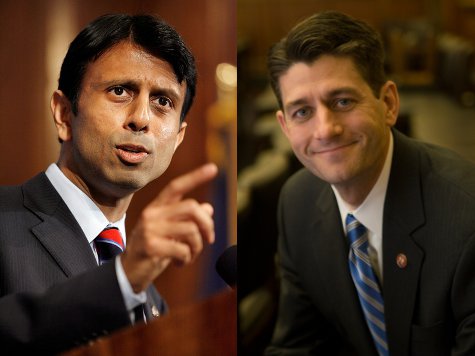
On one of the most important weekends to date in the 2012 presidential campaign, Wisconsin Rep. Paul Ryan and Louisiana Gov. Bobby Jindal appeared on ABC’s “This Week” and NBC’s “Meet The Press,” respectively, as Mitt Romney surrogates to discuss the Supreme Court decision that upheld Obamacare.
Their appearances made it seem as if they were two finalists for Romney’s vice presidential pick auditioning for their spot on the ticket.
Other names — such as Ohio Sen. Rob Portman, former Minnesota Gov. Tim Pawlenty, and Florida Sen. Marco Rubio — have been thrown around. And while there really are three people (Romney, his wife Ann, and Beth Myers, who Romney has tasked with helping him pick his running mate) whose opinions matter and who know how the search process is going, Ryan or Jindal add a lot to the ticket. Both would excite conservatives. Both are, sometimes to a fault, bookish and wonky, qualities voters may find more appealing in their leaders as the country tries to not go down Europe’s disastrous fiscal path. And they would bring electoral advantages.
Jindal, an American of Indian descent, would help Romney in the must-win state of Virginia, especially the northern part of the state that is home to many Americans of Indian descent and suburbanites who are a part of the “creative class.” Jindal is very Louisianan, but he is also relatable to many in Northern Virginia, whose clout is increasing in statewide elections. Because George Allen, of “Macaca” fame, who is on a down-ballot Senate race against Obama’s hand-picked candidate Tim Kaine, may turn off Northern Virginians and minorities, Jindal’s presence on the ticket could potentially offset Allen’s weaknesses.
Ryan would help Romney in the Midwest. Obama’s policies have turned off many blue collar workers throughout the Midwest. But those voters will not necessarily go over to Romney. Ryan, like his mentor, the late Jack Kemp, has won over working class voters in his district even while supporting fairly conservative principles, especially on fiscal issues and the budget.
And Ryan and Jindal both reinforce Romney’s greatest strength — an image as a competent problem solver.
On “This Week,” Ryan clearly articulated why conservatives have loathed the Supreme Court’s decision on the Affordable Care Act. “I think the chief justice had to contort logic and reason to come up with this ruling,” Ryan said. “The American people will be the judge and jury of this law come November.”
Ryan also effectively, like Romney should do, tied Obamacare to the economy, saying the “law is bad for Medicare, it’s bad for health care, it’s terrible for the economy, and it will move us closer toward a debt crisis.”
And Ryan called out the liberal George Stephanopoulos, something effective running mates have to do, and turned his accusation of GOP hypocrisy on Obamacare on its head by noting, to his face, that “the president on your show said this is not a tax. Then he sent his solicitor general to the Supreme Court to argue that it is a tax in order to get this past the Supreme Court.”
“If this was brought to the public as a tax, there’s no way this law would have passed into law in the first place,” Ryan said.
And, framing Obamacare as a symbol of a larger, more fundamental battle like Romney should do, Ryan forcefully said:
We disagree with the notion that our rights come from government, that the government can now grant us and define our rights. Those are ours. Those come from nature and God, according to the Declaration of Independence, a huge difference in philosophy.
“This election is a choice of two futures,” Ryan continued. “Do you want a government-centered society in a government-driven economy and government-rationed health care? Or do you want the American opportunity society with a safety net, a free economy, economic freedom, personal liberty?”
Ryan then said, “we have one more chance as a people to get that back, and that chance is going to come on November the 6th.”
On “Meet The Press,” Jindal said every governor has “two critical decisions to make” of whether to set up health exchanges and expand Medicaid.
“In Louisiana, we’re not doing either one of those things,” Jindal said. “I think it makes more sense to do everything we can to elect Mitt Romney to repeal Obamacare.”
When Howard Dean said growing Medicaid grows the economy, Jindal, like Ryan, quickly came back and said, “Look, federal dollars aren’t free. Those dollars are coming from us, from our children, our grandchildren. We’re borrowing money from China to spend on government programs we can’t afford.”
Jindal also talked about how Obamacare represents a more fundamental “threat of a new tax increase to change behavior.”
Jindal or Ryan would bring a lot to the ticket, but if Romney selects either of them, the most significant contribution either may make is helping Romney become a better candidate by clearly articulating why “Obamatax” is such a fundamental threat to the future of the republic, something on which Romney’s surrogates have so far underperformed.

COMMENTS
Please let us know if you're having issues with commenting.